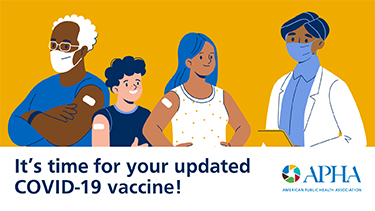With flu season just around the corner — and COVID-19 cases on the rise — public health experts are calling on Americans to take advantage of a trio of vaccines to protect their health.
New vaccinations are recommended this fall for flu, COVID-19 and respiratory syncytial virus, and their uptake is critical to protecting the health of families, individuals and communities, health officials say. The three viruses are responsible for the bulk of U.S. hospitalizations that occur in fall and winter in the U.S., according to the Centers for Disease Control and Prevention.
“Having vaccines approved is not enough — getting vaccinated is necessary for protection," Carlos del Rio, MD, FIDSA, president of the Infectious Diseases Society of America, said in a statement.
CDC recommended Tuesday that everyone 6 months and older get an updated COVID-19 vaccination. The vaccine has been reformulated to help protect against commonly circulating variants of SARS-CoV-2. Doses of the booster, which will be available from both Moderna and Pfizer-BioNTech, are expected to be available within the next week.
People who have not received previous doses of the COVID-19 vaccine or who haven’t received all of them are eligible for the new shot, as are people who have kept up with all their doses. Data from CDC show that both hospitalizations and deaths from COVID-19 have been on the rise in recent weeks.
“We know that many people who would benefit from COVID vaccination have not received it, resulting in preventable illnesses,” said Jeffrey Duchin, MD, FACP, FIDSA, health officer for Public Health Seattle and King County, during a Sept. 13 news briefing hosted by IDSA.
Older adults are most at risk for serious illness and death from COVID-19, so it is essential they receive their vaccinations, particularly if they live in group settings. But younger adults and children should receive their vaccinations as well.
Although a June study found that 70% of household cases of COVID-19 started with children, vaccination rates among kids have lagged, noted Tina Tan, MD, FAAP, FIDSA, an attending physician in the Division of Infectious Diseases at Chicago’s Ann & Robert H. Lurie Children’s Hospital.
“Data show that less than 40% of children 5 to 11 years of age have received at least one dose of COVID vaccine, and the numbers in the six months to four years (of age) population are much lower,” Tan said during the news briefing.
People visiting their doctor or pharmacist for their COVID-19 vaccination can get their flu shot at the same time, CDC says. This year’s seasonal flu vaccine has been formulated to combat commonly circulating strains, including some that may have fueled Australia’s recent record flu season, which sent high numbers of children to the hospital.
Older adults and young children are also being urged to get vaccinated against RSV, a common and highly contagious virus that is spread through coughs and sneezes and via surfaces. A new vaccine was approved against the disease this summer. CDC recommends that infants, adults ages 60 and older and children with certain medical conditions be vaccinated against RSV this fall.
“CDC estimates that every year RSV causes 60,000 to 160,000 hospitalizations and between 6,000 and 10,000 deaths among older adults,” said Duchin, who is also liaison to CDC’s Advisory Committee on Immunization Practices.
To find a location for flu and COVID-19 vaccinations, visit Vaccines.gov. Many pharmacies also have RSV vaccines in stock now.
Michele Late contributed to this article.